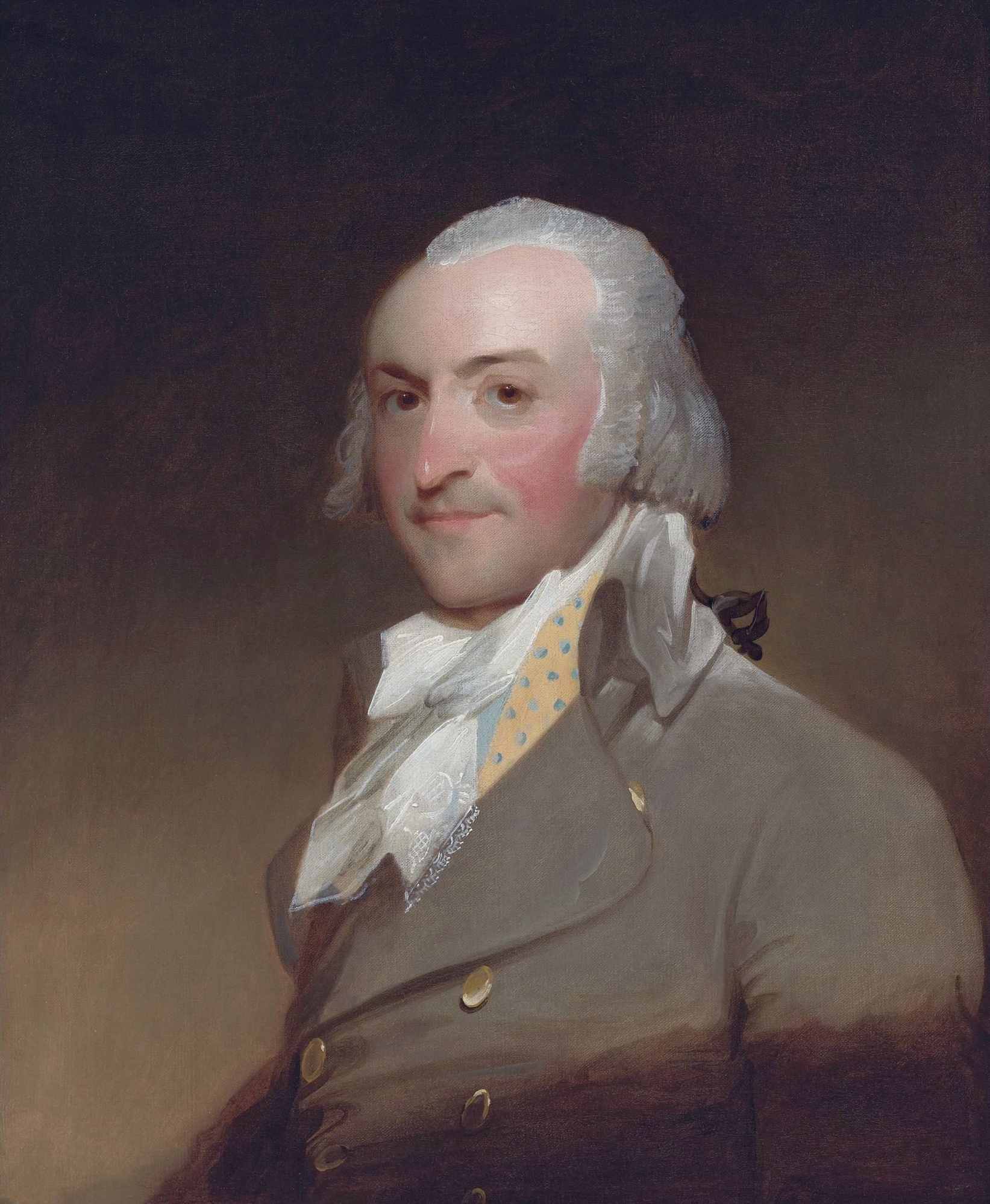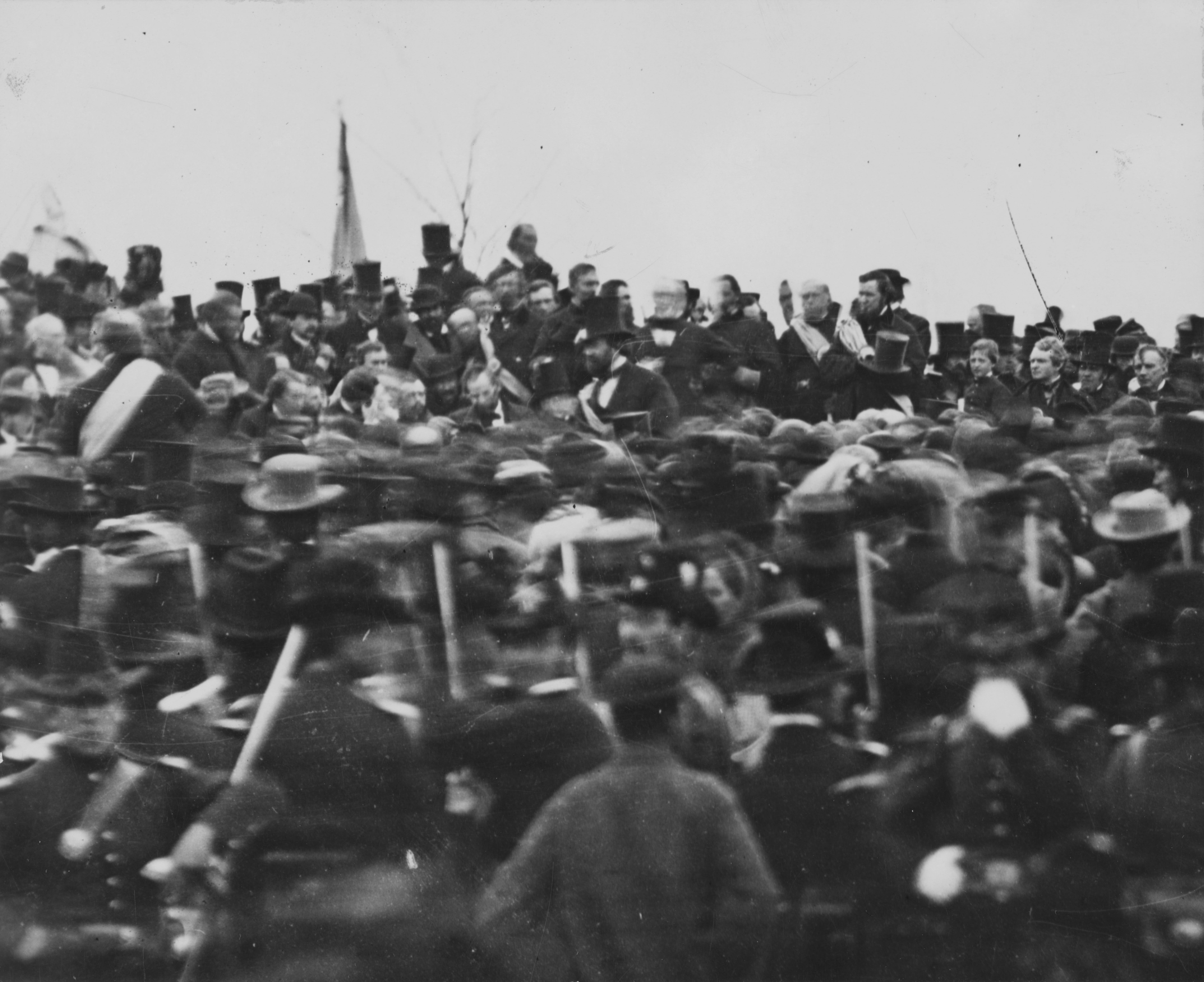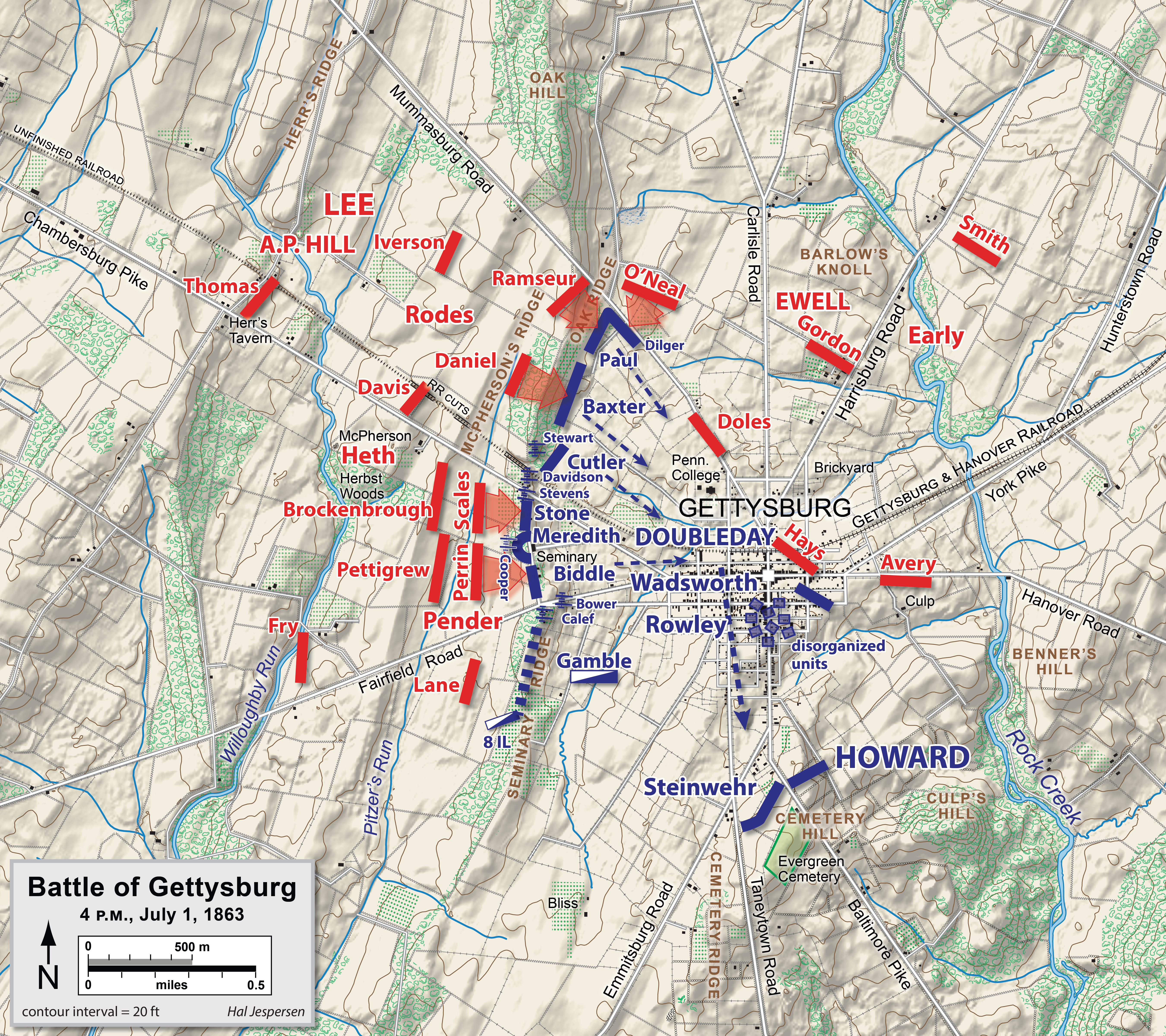|
Henry Louis Baugher
Henry Louis Baugher (July 18, 1804 – April 14, 1868) was an American Lutheran clergyman and academic. He was the President of Gettysburg College from 1850 until 1868. Background Henry Lewis Baugher was born in Abbottstown, Pennsylvania to Christian Frederick Baugher and Catherine Ann Elizabeth (Mottere) Baugher. His father was a tanner by trade and his paternal grandfather, John George Bager, was a pioneer German Lutheran pastor west of Pennsylvania's Susquehanna River. As a youth, Henry was educated by the Reverend David McConaughy of Gettysburg. Baugher entered Dickinson College in 1822 and was admitted to the Belles Lettres Literary Society that same year. He graduated as part of the Class of 1826. At the commencement ceremony, Baugher, who received secondary honors, gave the Latin Salutatory Address. After graduating from Dickinson, Baugher made arrangements to study law under Francis Scott Key, in Georgetown. After his mother's death, Baugher changed plans and enter ... [...More Info...] [...Related Items...] OR: [Wikipedia] [Google] [Baidu] |
Battle Of Gettysburg
The Battle of Gettysburg () was fought July 1–3, 1863, in and around the town of Gettysburg, Pennsylvania, by Union and Confederate forces during the American Civil War. In the battle, Union Major General George Meade's Army of the Potomac defeated attacks by Confederate General Robert E. Lee's Army of Northern Virginia, halting Lee's invasion of the North. The battle involved the largest number of casualties of the entire war and is often described as the war's turning point due to the Union's decisive victory and concurrence with the Siege of Vicksburg.Rawley, p. 147; Sauers, p. 827; Gallagher, ''Lee and His Army'', p. 83; McPherson, p. 665; Eicher, p. 550. Gallagher and McPherson cite the combination of Gettysburg and Vicksburg as the turning point. Eicher uses the arguably related expression, " High-water mark of the Confederacy". After his success at Chancellorsville in Virginia in May 1863, Lee led his army through the Shenandoah Valley to begin his second ... [...More Info...] [...Related Items...] OR: [Wikipedia] [Google] [Baidu] |
Dickinson College Alumni
Dickinson may refer to: People * Dickinson (name) Place names United States * Dickinson, Minnesota * Dickinson, Broome County, New York * Dickinson, Franklin County, New York * Dickinson, North Dakota * Dickinson, Texas * Dickinson township, Cumberland County, Pennsylvania * Dickinson County, Iowa * Dickinson County, Kansas * Dickinson County, Michigan * Jonathan Dickinson State Park, southeast Florida * Port Dickinson, New York Canada * Dickinson's Landing, Ontario, ghost town Education United States * Dickinson College, liberal arts college in Carlisle, Pennsylvania * Dickinson High School (Dickinson, North Dakota) * John Dickinson High School, Wilmington, Delaware * Dickinson School of Law, Carlisle, Pennsylvania * Dickinson State University, public university in Dickinson, North Dakota * Fairleigh Dickinson University, university in New Jersey Other uses * Becton Dickinson, American medical equipment manufacturer * ''Dickinson'' (TV series), an American comedy TV s ... [...More Info...] [...Related Items...] OR: [Wikipedia] [Google] [Baidu] |
American People Of German Descent
German Americans (german: Deutschamerikaner, ) are Americans who have full or partial German ancestry. With an estimated size of approximately 43 million in 2019, German Americans are the largest of the self-reported ancestry groups by the United States Census Bureau in its American Community Survey. German Americans account for about one third of the total population of people of German ancestry in the world. Very few of the German states had colonies in the new world. In the 1670s, the first significant groups of German immigrants arrived in the British colonies, settling primarily in Pennsylvania, New York and Virginia. The Mississippi Company of France moved thousands of Germans from Europe to Louisiana and to the German Coast, Orleans Territory between 1718 and 1750. Immigration ramped up sharply during the 19th century. There is a "German belt" that extends all the way across the United States, from eastern Pennsylvania to the Oregon coast. Pennsylvania, with 3.5 milli ... [...More Info...] [...Related Items...] OR: [Wikipedia] [Google] [Baidu] |
19th-century American Lutheran Clergy
The 19th (nineteenth) century began on 1 January 1801 ( MDCCCI), and ended on 31 December 1900 ( MCM). The 19th century was the ninth century of the 2nd millennium. The 19th century was characterized by vast social upheaval. Slavery was abolished in much of Europe and the Americas. The First Industrial Revolution, though it began in the late 18th century, expanding beyond its British homeland for the first time during this century, particularly remaking the economies and societies of the Low Countries, the Rhineland, Northern Italy, and the Northeastern United States. A few decades later, the Second Industrial Revolution led to ever more massive urbanization and much higher levels of productivity, profit, and prosperity, a pattern that continued into the 20th century. The Islamic gunpowder empires fell into decline and European imperialism brought much of South Asia, Southeast Asia, and almost all of Africa under colonial rule. It was also marked by the collapse of the large ... [...More Info...] [...Related Items...] OR: [Wikipedia] [Google] [Baidu] |
People From Adams County, Pennsylvania
A person ( : people) is a being that has certain capacities or attributes such as reason, morality, consciousness or self-consciousness, and being a part of a culturally established form of social relations such as kinship, ownership of property, or legal responsibility. The defining features of personhood and, consequently, what makes a person count as a person, differ widely among cultures and contexts. In addition to the question of personhood, of what makes a being count as a person to begin with, there are further questions about personal identity and self: both about what makes any particular person that particular person instead of another, and about what makes a person at one time the same person as they were or will be at another time despite any intervening changes. The plural form "people" is often used to refer to an entire nation or ethnic group (as in "a people"), and this was the original meaning of the word; it subsequently acquired its use as a plural form of per ... [...More Info...] [...Related Items...] OR: [Wikipedia] [Google] [Baidu] |
1868 Deaths
Events January–March * January 2 – British Expedition to Abyssinia: Robert Napier leads an expedition to free captive British officials and missionaries. * January 3 – The 15-year-old Mutsuhito, Emperor Meiji of Japan, declares the ''Meiji Restoration'', his own restoration to full power, under the influence of supporters from the Chōshū and Satsuma Domains, and against the supporters of the Tokugawa shogunate, triggering the Boshin War. * January 5 – Paraguayan War: Brazilian Army commander Luís Alves de Lima e Silva, Duke of Caxias enters Asunción, Paraguay's capital. Some days later he declares the war is over. Nevertheless, Francisco Solano López, Paraguay's president, prepares guerrillas to fight in the countryside. * January 7 – The Arkansas constitutional convention meets in Little Rock. * January 9 – Penal transportation from Britain to Australia ends, with arrival of the convict ship ''Hougoumont'' in Western Australi ... [...More Info...] [...Related Items...] OR: [Wikipedia] [Google] [Baidu] |
1804 Births
Eighteen or 18 may refer to: * 18 (number), the natural number following 17 and preceding 19 * one of the years 18 BC, AD 18, 1918, 2018 Film, television and entertainment * ''18'' (film), a 1993 Taiwanese experimental film based on the short story ''God's Dice'' * ''Eighteen'' (film), a 2005 Canadian dramatic feature film * 18 (British Board of Film Classification), a film rating in the United Kingdom, also used in Ireland by the Irish Film Classification Office * 18 (''Dragon Ball''), a character in the ''Dragon Ball'' franchise * "Eighteen", a 2006 episode of the animated television series ''12 oz. Mouse'' Music Albums * ''18'' (Moby album), 2002 * ''18'' (Nana Kitade album), 2005 * '' 18...'', 2009 debut album by G.E.M. Songs * "18" (5 Seconds of Summer song), from their 2014 eponymous debut album * "18" (One Direction song), from their 2014 studio album ''Four'' * "18", by Anarbor from their 2013 studio album '' Burnout'' * "I'm Eighteen", by Alice Cooper common ... [...More Info...] [...Related Items...] OR: [Wikipedia] [Google] [Baidu] |
Gettysburg Address
The Gettysburg Address is a Public speaking, speech that President of the United States, U.S. President Abraham Lincoln delivered during the American Civil War at the dedication of the Gettysburg National Cemetery, Soldiers' National Cemetery, now known as Gettysburg National Cemetery, in Gettysburg, Pennsylvania on the afternoon of November 19, 1863, four and a half months after the Union (American Civil War), Union armies defeated Confederate States of America, Confederate forces in the Battle of Gettysburg, the Civil War's deadliest battle. It remains one of the best known speeches in history of the United States, American history. Lincoln's carefully-crafted but brief address, which was not even scheduled as the day's primary speech, came to be seen as one of the greatest and most influential statements on the American national purpose. In just 271 words, beginning with the now famous phrase "Four 20 (number), score and seven years ago," referring to the signing of the U ... [...More Info...] [...Related Items...] OR: [Wikipedia] [Google] [Baidu] |
Abraham Lincoln
Abraham Lincoln ( ; February 12, 1809 – April 15, 1865) was an American lawyer, politician, and statesman who served as the 16th president of the United States from 1861 until his assassination in 1865. Lincoln led the nation through the American Civil War and succeeded in preserving the Union, abolishing slavery, bolstering the federal government, and modernizing the U.S. economy. Lincoln was born into poverty in a log cabin in Kentucky and was raised on the frontier, primarily in Indiana. He was self-educated and became a lawyer, Whig Party leader, Illinois state legislator, and U.S. Congressman from Illinois. In 1849, he returned to his successful law practice in central Illinois. In 1854, he was angered by the Kansas–Nebraska Act, which opened the territories to slavery, and he re-entered politics. He soon became a leader of the new Republican Party. He reached a national audience in the 1858 Senate campaign debates against Stephen A. Douglas. ... [...More Info...] [...Related Items...] OR: [Wikipedia] [Google] [Baidu] |
Lutheran Theological Seminary At Gettysburg
The Lutheran Theological Seminary at Gettysburg (Gettysburg Seminary) was a seminary of the Evangelical Lutheran Church in America (ELCA) in Gettysburg, Pennsylvania. It was one of seven ELCA seminaries, one of the three seminaries in the Eastern Cluster of Lutheran Seminaries, and a member institution of the Washington Theological Consortium. It was founded in 1826 under prominent but controversial theologian and professor Samuel Simon Schmucker (1799-1873) for the recently organized General Synod of the Evangelical Lutheran Church in the United States. The seminary was the oldest continuing Lutheran seminary in the United States until it was merged on July 1, 2017, after 189 years of operation, with the nearby and former rival Lutheran Theological Seminary at Philadelphia to form the United Lutheran Seminary. The new institution continues to use both campuses. The Gettysburg Seminary served the church as a pioneer in theological education creating among Lutheran seminaries the ... [...More Info...] [...Related Items...] OR: [Wikipedia] [Google] [Baidu] |
Lutheran
Lutheranism is one of the largest branches of Protestantism, identifying primarily with the theology of Martin Luther, the 16th-century German monk and reformer whose efforts to reform the theology and practice of the Catholic Church launched the Protestant Reformation. The reaction of the government and church authorities to the international spread of his writings, beginning with the '' Ninety-five Theses'', divided Western Christianity. During the Reformation, Lutheranism became the state religion of numerous states of northern Europe, especially in northern Germany, Scandinavia and the then- Livonian Order. Lutheran clergy became civil servants and the Lutheran churches became part of the state. The split between the Lutherans and the Roman Catholics was made public and clear with the 1521 Edict of Worms: the edicts of the Diet condemned Luther and officially banned citizens of the Holy Roman Empire from defending or propagating his ideas, subjecting advocates of Lutheranis ... [...More Info...] [...Related Items...] OR: [Wikipedia] [Google] [Baidu] |



_1938.jpg)




.jpg)